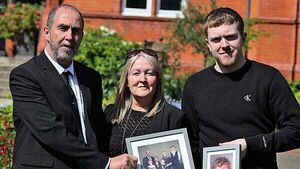Family of teen who died after routine surgeries left with 'more questions than answers' after inquest

Seán McCárthaigh
The family of a teenager who died suddenly and unexpectedly after routine surgical procedures at a children’s hospital in Dublin four years ago claim they have been left with “more questions than answers” following an inquest into his death.
A sitting of Dublin District Coroners Court heard doctors admit they remain baffled how Carlow student, Cillian Gorman, acquired what was described as a “vanishingly rare” blood clotting condition in a sudden and catastrophic manner.
The 14-year-old from Tullow, Co Carlow, was admitted to Children’s Health Ireland at Crumlin on March 14th, 2021, and underwent both an endoscopy on his upper and lower gastrointestinal tract and a liver biopsy the following day.
The student had the procedures as part of tests being conducted by doctors who suspected he might be developing inflammatory bowel disease.
The inquest on Tuesday heard his condition deteriorated and he became unresponsive a few hours later while he was recovering from the surgery, before he was confirmed to have suffered brain stem death on March 20th, 2021.
A large group of relatives and friends of Cillian’s parents, Deirdre and Declan Gorman, burst into applause when the family’s counsel, David Roberts BL, called for a verdict of death due to medical misadventure at the end of evidence from several medical witnesses.
Mr Roberts claimed Cillian was a healthy boy but had suffered a catastrophic event resulting in his death while under the care of the hospital.
He said Cillian’s parents did not accept the medical evidence they had heard at the inquest.
However, counsel for CHI at Crumlin, Conor Halpin SC, claimed that a narrative verdict was the appropriate finding as there was no evidence linking the care provided by the hospital to the boy’s death to support a finding of medical misadventure.
The coroner, Clare Keane, recorded the cause of death as a lack of oxygen to the brain due to acute intracranial bleeding secondary to thrombophilia – a condition which causes the blood to clot.
Dr Keane noted that significant factors in the background of the deceased’s health were autoimmune hepatitis and inflammatory bowel disease.
However, the coroner stressed that they were not directly contributory to his death.
Dr Keane said she would record a narrative verdict to reflect the complexity of the case and how it had been impossible to establish what caused the blood clotting.
The inquest heard that specialist DNA testing had even been carried out but had proven inconclusive, while a pathologist who carried out a postmortem on the teenager’s body remarked that the case was “so rare, so unusual and so complicated.”
A consultant gastroenterologist and hepatologist at CHI at Crumlin, Emer Fitzpatrick, said a finding that Cillian had thrombotic microangiopathy (a rare but serious disease otherwise known as TMA which damages small blood vessels resulting in clots) was one they had never come across in Dublin before.
“I’ve never seen a child like that,” said Dr Fitzpatrick. She described TMA as “vanishingly rare.”
A paediatric radiologist who carried out the liver biopsy, David Rea, said pre-surgery tests indicated the patient had a slightly elevated risk of bleeding, but it was deemed safe to proceed with the procedure.
Dr Rea said there were no concerns while Cillian was in the operating theatre, and he had remained in a stable condition.
The inquest heard that Cillian had been brought back to a recovery ward at 2.30pm.
Dr Fitzpatrick said she reviewed the patient at 6.15pm when he appeared in good form and smiling after having eaten a few slices of toast.
She pointed out that he was also under enhanced observation after a liver biopsy, but there were no concerns about any of his vital signs.
The inquest heard that Cillian subsequently complained of a headache and vomiting later that evening.
His mother raised the alarm when he suddenly became unresponsive after a few deep breaths at 8.40pm.
He was transferred to the hospital’s intensive care unit, where it was found that he had massive internal pressure on his brain.
Doctors decided that a plan to transfer the patient to CHI at Temple Street could not go ahead as his condition was too unstable.
Evidence was heard that he remained comatose for the next few days until March 20th, 2021, when brain stem death was confirmed.
A consultant paediatrician, Michelle Dillon, gave evidence of how Cillian was treated at St Luke’s Hospital in Kilkenny in June 2020 after he had been experiencing worsening dizziness.
The inquest heard that the patient, who also suffered some diarrhoea and weight loss, was diagnosed with anaemia for which he was prescribed iron.
However, Dr Dillon said she was also concerned that Cillian might be suffering from inflammatory bowel disease, and he was referred to CHI at Crumlin.
A neuropathologist, Michael Farrell, said a postmortem examination of the patient’s brain found it was “massively swollen” and there were multiple areas of bleeding within the brain, which he believed had occurred in a “hyper-acute” manner.
However, Prof Farrell admitted he could not explain why it had happened.
A paediatric pathologist, Maureen O’Sullivan, who also carried out a postmortem on the body, said she had “never seen anything like this before.”
Prof O’Sullivan said the most salient finding was in relation to “very abnormal clotting” throughout the patient’s blood vessels.
She said TMA was highly abnormal for patients who might have inflammatory bowel disease, but there were multiple sites of clotting in Cillian’s organs, including his lung, liver and heart.
However, the pathologist acknowledged she had been unable to establish what had triggered such clotting.
Addressing Cillian’s parents at the conclusion of the inquest, Dr Keane observed that the loss of their son, the second oldest of four children, was “unbearable” for his family.
The coroner expressed hope that the inquest had clarified some issues but said she also realised that “you still may have more questions than answers.”
Speaking on behalf of Cillian’s parents after the hearing, the family’s solicitor, Simon McElwee, said they did not agree with the narrative verdict but accepted how the coroner had conducted the inquest.
“Cillian was a robust, normal child when he went into the hospital. He was dead when he came out. After hearing all the evidence of the doctors today, my clients learned nothing new and have more questions than answers. They have no trust in the CHI,” said Mr McElwee.





